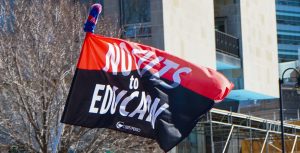Where is Elementary Teachers of Toronto (ETT) headed?
What is going on with Elementary Teachers of Toronto (ETT)?
There appears to be a split in the leadership of the local. I say “appears” because, while quite a few progressive members of the local are willing to discuss the problem, others have declined to comment.
The problem came to a head last spring during the election campaign for the current executive. On one side was a group who laid out a clear, progressive and activist slate, called Building Union Power (BUP). Opposing them, were executive members who appeared to be more interested in standard union activities like supporting members, contract bargaining and so on. At the time, these members were known as Governing for All, though current ETT president Jennifer Brown told School in September, that it was a name assigned to them rather than taken on.
After the election results came in, BUP members held a minority of six positions out of fourteen on the executive.
I should make my bias clear from the beginning. As an education and union activist, my alliance is with the members of the BUP. Its members, mentioned in this article, are friends and fellow progressive educators. But that hasn’t stopped me from checking information and seeking the perspective of those with whom I might disagree.
A contentious election
Building Union Power (BUP) presented an activist plan to ETT’s 11,000 members. It was centred around rank and file power; involving teachers in a much more democratic, politically engaged union local. I wasn’t able to find a discernible platform from the other candidates outside of BUP, but certainly invite any of those people to share their ideas about union building, it’s connection with education, the election or anything related, for that matter.
The election was contentious. Just before the ETT members were set to vote online, the Chief Returning Officer (CRO), John Hollins alleged that BUP incumbent candidates used ETT member email information unavailable to new candidates. According to BUP executive member Nigel Barriffe,  Mr. Hollins was told that this was normal. In the past, this sort of allegation might result in a warning- not a sanction. But Mr. Hollins issued sanctions against BUP incumbents Yolanda B’Dacy, Natasha Rodrigez and former ETT president Joy Lachica , posting the allegations above their names on the election portal. Ms. Lachica commented later that “violations were called that had never been done before.”
Mr. Hollins was told that this was normal. In the past, this sort of allegation might result in a warning- not a sanction. But Mr. Hollins issued sanctions against BUP incumbents Yolanda B’Dacy, Natasha Rodrigez and former ETT president Joy Lachica , posting the allegations above their names on the election portal. Ms. Lachica commented later that “violations were called that had never been done before.”
An allegation against a non-BUP candidate was quickly withdrawn with an apology issued, according to Mr. Barriffe.
School contacted Mr. Hollins at the end of September for his comments about the above sanctions. He said that he was hired by ETT to run the election, saying: “The process was followed – some people didn’t like the result.” He declined further comment.
In a letter to Elementary Teachers Federation of Ontario (ETFO) president Sam Hammond, Mr. Barriffe, argued that posting these allegations led some ETT members to think that they were not allowed to vote for them. The allegations were withdrawn, he added, after it was learned that other candidates had done the same thing with emails as BUP. But for BUP candidates it was too late; the damage had been done; voting was well underway.
Former ETT president, Joy Lachica was not happy with the way the election was conducted. She says that election manuals came late for review by the ETT executive of the time and that there wasn’t ample opportunity to vet the chief returning officer (CRO) to see if he was an appropriate choice for a local like ETT. It has certainly not been easy to be a member of BUP with epithets like “Stalinists” and “outsiders” and even a homophobic comment, according to a member who asked to remain anonymous, tossed their way.
Uncertainty followed the election. ETT members like teacher, Karen Jutzi took to Facebook to complain about the cancellation of a general meeting for members back in June – one in which they could ask questions about the local’s response to school safety in light of COVID-19: “So apparently, our union executive got together last week and voted to CANCEL a general meeting that over 230 members had already registered to attend …Rationale included that the meeting did not have “prior executive approval” (so to HELL with the 200+ members who wanted the opportunity to make motions and ask questions, particularly about how we want to reopen schools safely in the fall.”
There has since been a general meeting online.
Since 2018, members have found it very difficult to discuss their issues or propose their own motions at these meetings, whether virtual or in person. Several I have spoken with say, with great frustration, non-BUP members have raised many Robert’s Rules of Order objections, and prolonged the meetings until quorum was lost. One meeting that was demanded by over 600 members to discuss the safe reopening of school was conducted by phoning in instead of on zoom. Members I spoke with complained that they lost their phone connections and couldn’t get back in. Such is the current state of democratic participation.
Closing rifts
Still, Ms. Lachica wants to see rifts close adding that there needs to be an acknowledgement of the different skills executive members have to work together and raise the union. “The greatest thing that could happen, is for people to come together, begin to tell the truth and build bridges.”
There is certainly more to this story, but little information available that hasn’t come from Building Union Power. School spoke twice with current ETT President, Jennifer Brown and sent her a list of questions about her platform, the sanctions noted above as well as alleged leaks of information about voting patterns in the election. She declined to comment on any aspect of the election. The same was true for ETT Vice-President, Jamie Thom.
Fair enough. But, since the Ford government was elected two and a half years ago, unions have been front and centre, leading the fight against retrograde policies like increasing class sizes, cutting funds both locally and provincially, cutting supports for special needs students – the list is enormous. Unions working with parent and community groups have filled the lawns of Queen’s Park and made it clear that union power isn’t just about better contracts for teachers, but about a democratic and high-quality education system. So, it’s equally fair to ask what the executive of ETT, the largest elementary teacher local in the province, will do to further the campaign to support public education.
Building Union Power: Who are they?
Members of Building Union Power (BUP) have been clear what they think about the purpose of ETT in the world of education, schools and the communities that surround all of it
First, there is a lot of evidence that they were very dedicated to helping the members they were elected to support. The incumbent group, Joy Lachica, President, Yolanda B’Dacy, Vice-President, and Executive Officers Helen Victoros, Nigel Barriffe, Felicia Samuel and Natasha Rodriguez really worked hard in their different areas. During the election, teachers posted statements on social media praising what they had done for them. One, who had never met Joy, said she was extremely impressed by how well she listened, how empathetic she was about the difficulties she had faced, and how she went about setting things right. Yolanda spent hundreds of hours making sure members got their strike pay.

The first thing you see on the BUP home page is their basic message, “Stronger Together.” To that end, they support Black Lives Matter:
“As educators, we stand in solidarity with #BlackLivesMatter and all those seeking justice for the many tragically lost Black lives, especially those lost most recently…Ahmaud Arbery, George Floyd, Tony McDade and Regis Korchinski-Paquet. We condemn the systems of violence that allow this kind of violence, and we commit to fighting daily within our classrooms and society for justice.”
This is followed by a series of photographs showing them walking their talk, standing in support of their union along with parents against the cuts to education during the one day strikes and demonstrations against cuts that characterized this negotiation school year.
What about this bothered ETT executive members who ran against BUP? It would be good to hear from them.
Building Union Power members believe that no member should struggle in isolation, that collective power can be built school by school and system-wide. They commit to speaking to every union member so that the people they represent can organize and respond to the many issues, like class size, fewer resources for students, school discipline health and safety concerns, bullying principals and so on that plague school communities.
They want to have strong activist union with strong organizers, like those in Los Angeles or Chicago. They also grasp the importance of local community and educator alliances. The BUP folks are also about action. During the pandemic they’ve pushed to make it simple for members to donate to people who don’t have secure access to food. They’ve promoted a “Vote No” campaign against the Ford government budget cuts, demanding budgets based on students’ needs, rather than government’s wish to make its friends happy. They’ve even set up the Union School Podcast so that parents, activists and educators can get their voices heard about saving public education.
As the group said on its election platform:
Building Union Power commits to:
-
-
Talking with every ETT member- you and your co-workers are the “union”, knowing each other and your issues lay the groundwork for school and local-wide issues to get concrete results.
-
Organizing to take on the key issues you identify like unacceptably large class sizes, a lack of response on health and safety issues, bullying Administrators, diminishing resources for our most vulnerable students, school discipline concerns, and a lack of meaningful input into the decisions that impact you school communities and yourselves.
-
Building the strong structures in each of your schools and local-wide to take effective, direct action, change power dynamics, and ensure the victories you win are protected.
-
Prioritizing the crucial relationship building you’ve begun with parents and community groups. A broad alliance creates the ongoing power you need to fight for strong schools, strong communities, and a government that is truly responsive to the needs of all.
-
Modernizing and revitalizing your union, using the tried and true organizing methods that Teacher Unions across North America, from British Columbia to Los Angeles to Chicago have used with such incredible success.
-
What, if anything, about this platform has caused so much strife within ETT? If some of its members don’t like it, they need to criticize it openly so that the local can be clear about where it stands on the question of unions as more than just advocates for membership, but for the communities in which teachers work.
Solidarity
There are huge forces aligned against public education, not just in Ontario, but across North America. We can see this in the generations of cutbacks to schools everywhere, in the efforts of our own provincial government to cut back on teachers, introduce online learning, ignore the cultures and history of Indigenous people and even recently, roll back seniority for hiring teachers. There is a massive amount of work to do to counter these forces. Unions and locals cannot afford to fight amongst themselves.
I call on the current President Jennifer Brown and Vice President Jamie Thom, to explain what they plan to do about holding general membership meetings so that ETT members can ask questions about their position on issues like cuts imposed by the Ford government, their response to the way school reopening has been handled, vulnerable students, school safety, community activism and so on. They need to explain clearly what direction they want ETT to move on these issues, since it’s clear they opposed members of a group that clearly takes a stand on them.
It’s time to clear the air. Solidarity can’t live in silence.


